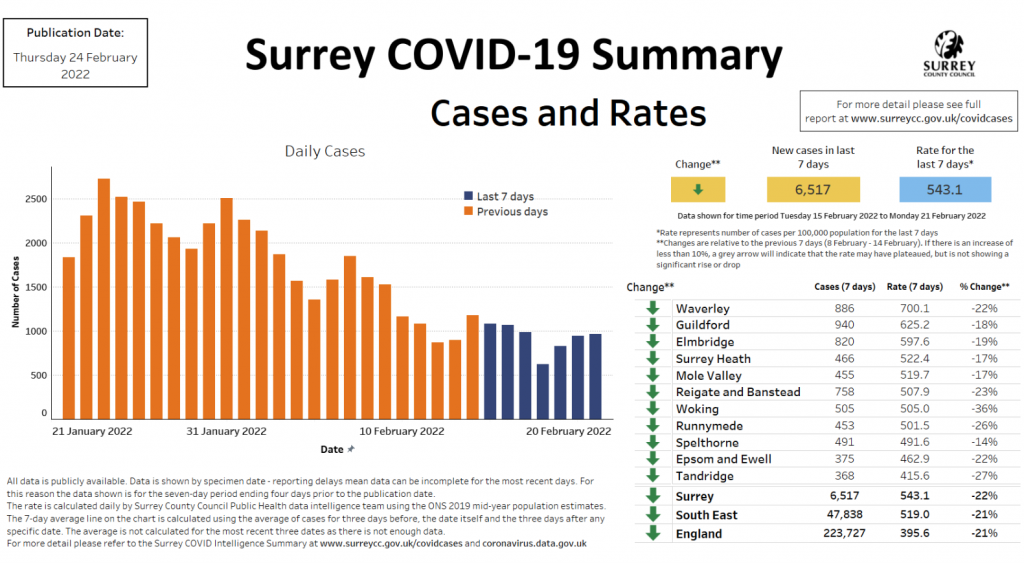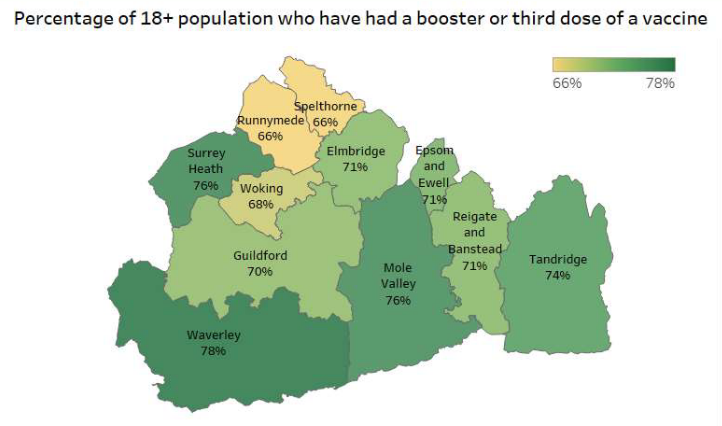 Abraham Lincoln
If given the truth, the people can be depended upon to meet any national crisis...
Abraham Lincoln
If given the truth, the people can be depended upon to meet any national crisis...
 Guildford news...
for Guildford people, brought to you by Guildford reporters - Guildford's own news service
Guildford news...
for Guildford people, brought to you by Guildford reporters - Guildford's own news service
Living with Covid Does Not Mean Ignoring It, Says SCC’s Public Health Chief
Published on: 24 Feb, 2022
Updated on: 25 Feb, 2022
local democracy reporter
People who don’t stay home when they are infected with Covid are no longer breaking the law from today – but Surrey’s public health chief says they should still self-isolate.
On Monday Prime Minister Boris Johnson announced his plan to “live with Covid” in England, ending contact tracing, self-isolation support payments and free tests.
Ruth Hutchinson, who has led Surrey County Council’s public health team throughout two years of the virus, says ‘living with Covid’ does not mean ignoring it.
She told the Local Democracy Reporting Service: “Only the World Health Organisation can declare a pandemic and they haven’t declared it’s over, because it’s not.
“There’s a real shift, today’s the big day. The legal requirement is going, but it’s really important that the guidance hasn’t changed.”
She declined to say if she thought the decision itself was a risky one, but urged people to continue to self-isolate out of a sense of social responsibility.
“We’ve all been used to living with flu,” she said. “You have the flu, you don’t go into work. If your kids have diarrhoea and vomiting, you keep them off school for 48 hours.
“Our rates are declining but there is still a lot of Covid in the community so we still need to be cautious.”
Surrey’s rate was 543 cases per 100,000 people in the week up to Monday (February 21).
This is down 22 per cent on the previous week, having declined at the same rate as England generally, but it is still above the England average of 396 cases per 100,000.
There was also a wide range across the county, from 416 in Tandridge to 700 in Waverley.
You are now no longer legally obliged to tell your employer if you test positive, but has there been a change to a previous culture that perhaps rewarded staff who came into work despite being unwell?
“I definitely think it has changed,” said Ms Hutchinson. “People would struggle in with symptoms before and the pandemic has shown the need to protect others.”
From today (February 24), bosses cannot require staff with Covid to self-isolate and if people do self-isolate, they won’t get any money from the Government for doing so.
Does she think this decision was evidence-based or political?
“I think it is a challenging decision at what moment we would lift the restrictions,” she said. “There is no textbook formula.
“The evidence all points to the strength of the vaccine. The success of the vaccination programme has been phenomenal – that’s what has made the difference.”
Eighty-five per cent of eligible Surrey residents have taken up a first jab, 80 per cent the second one too, and 72 per cent have also had the booster.
The public health director said this is a high level, but she would like it to be higher. More than a quarter of the county’s population is not fully protected.
“Those who are yet to get around to it will be welcomed with open arms at the vaccination centres,” she said.
The guidance to have twice weekly tests in schools was removed on Monday.
And from April 1, free lateral flow tests will be scrapped in England. You can now only order a batch every three days to deter stockpiling.
“Time will tell” if people will stop regular testing once they have to pay for it.
People testing positive are still advised to stay at home and avoid contact with other people for at least five full days.
They should do this until they have received two negative test results on consecutive days.
Will people follow this guidance, now that it’s no longer a legal requirement? “My initial sense is people will still adhere to it,” said Ms Hutchinson.
“I know residents take a keen interest in our rates, the data gets a lot of hits.
“As we step into this new phase I anticipate that will continue. No one is saying Covid is over, I don’t hear that.
“It’s here with us for the long term.”
Can she see us still wearing masks in shops and on buses in five years’ time?
“I can see that being the case for quite a while. In some parts of the world they did it before.
“We’ve got used to it, we’ve all got them in our pockets and bags, it’s become what we do.”
Recent Articles
- Guildford Institute’s Crowdfunding Project for Accessible Toilet in its New Community and Wellbeing Centre
- Letter: Guildford – Another Opportunity Missed?
- Letter: GBC’s Corporate Strategy – Where Is the Ambition?
- My Memories of John Mayall at a Ground-breaking Gig in Guildford Nearly Six Decades Ago
- Westborough HMO Plans ‘Losing the Heart of the Street’ Says Resident
- College Invests to Boost Surrey’s Economy and Close Digital Skills Gap
- Community Lottery Brings Big Wins for Local Charities
- GBC Housing Plan Promises ‘A Vibrant Urban Neighbourhood’ Near Town Centre
- Hospital Pillows ‘Shortage’ at the Royal Surrey
- Updated: Caravans Set Up Camp at Ash Manor School


Search in Site
Media Gallery
Dragon Interview: Local Artist Leaves Her Mark At One of England’s Most Historic Buildings
January 21, 2023 / No Comment / Read MoreDragon Interview: Lib Dem Planning Chair: ‘Current Policy Doesn’t Work for Local People’
January 19, 2023 / No Comment / Read MoreA3 Tunnel in Guildford ‘Necessary’ for New Homes, Says Guildford’s MP
January 10, 2023 / No Comment / Read More‘Madness’ for London Road Scheme to Go Ahead Against ‘Huge Opposition’, Says SCC Leader
January 6, 2023 / No Comment / Read MoreCouncillor’s Son Starts Campaign for More Consultation on North Street Plan
December 30, 2022 / No Comment / Read MoreCounty Council Climbs Down Over London Road Works – Further ‘Engagement’ Period Announced
December 14, 2022 / No Comment / Read MoreDragon Interview: GBC Reaction to the Government’s Expected Decision to Relax Housing Targets
December 7, 2022 / No Comment / Read MoreHow Can Our Town Centre Businesses Recover? Watch the Shop Front Debate
May 18, 2020 / No Comment / Read More













Recent Comments